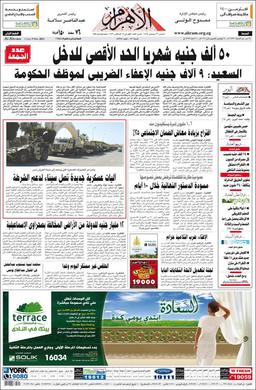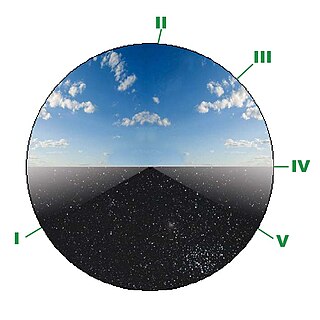Other uses
- Operation Phantom Fury, The Second Battle of Falluja, code-named Operation Al-Fajr and Operation Phantom Fury
- Al-Fajr Movement, a Syrian Islamic militant group, reported to have cooperated with Al-Nusra Front in 2012
Al-Fajr (الفجر) may refer to:

Al-Ahram, founded on 5 August 1876, is the most widely circulating Egyptian daily newspaper, and the second oldest after al-Waqa'i`al-Masriya. It is majority owned by the Egyptian government, and is considered a newspaper of record for Egypt.

The Fajr prayer is one of the five mandatory salah, to be performed anytime starting from the moment of dawn, but not after sunrise. The Isha prayer, which is the daily prayer directly before the Fajr prayer, usually does not take place after midnight.

Al-Fajr is the eighty-ninth chapter (sura) of the Quran, with 30 verses (ayat). The sura describes destruction of disbelieving peoples: the Ancient Egyptians, the people of Iram of the Pillars, and Mada'in Saleh. It condemns those who love wealth and look with disdain upon the poor and orphans. Righteous people are promised Paradise – the final verse says "And enter you My Paradise!". The Surah is so designated after the word wal-fajr with which it opens.

Taha Hussein was one of the most influential 20th-century Egyptian writers and intellectuals, and a figurehead for the Arab Renaissance and the modernist movement in the Arab world. His sobriquet was "The Dean of Arabic Literature" . He was nominated for the Nobel Prize in Literature twenty-one times.

Alaa Al Aswany is an Egyptian writer, novelist, and a founding member of the political movement Kefaya.
Hilal or Al-Hilal may refer to:
The Nahda, also referred to as the Arab Awakening or Enlightenment, was a cultural movement that flourished in Arab-populated regions of the Ottoman Empire, notably in Egypt, Lebanon, Syria, and Tunisia, during the second half of the 19th century and the early 20th century.
As of the early 2000s, Sudan had one of the most restrictive media environments in Africa. Sudan's print media since independence generally have served one of the political parties or the government in power, although there occasionally were outspoken independent newspapers.
Akhbar in Arabic (أخبار) is the plural of khabar (خبر), meaning news or, in Classical Arabic, reports about significant past events. The Arabic term occurs in the titles of many newspapers and other media, and may refer to:
Hani Mohammed Yusuf al-Siba'i is an Egyptian Islamic scholar who was a member of Egyptian Islamic Jihad and now lives in London as a political refugee. Efforts to deport him have failed. He is a supporter of al-Qaeda and is used as a scholarly reference by the movement. The leader of al-Qaeda, Ayman al-Zawahiri, listed him as one of four scholars that Muslims worldwide should follow, alongside Abu Muhammad al-Maqdisi, Abu Qatada and Dr. Tariq Abdelhaleem.

Al-Dostor (also Al-Dostour and Al-Dustour), is an independent Daily Egyptian opposition newspaper.
Workers Committee for National Liberation – Political Organisation for the Working Class was a militant anti-imperialist labour organisation in Egypt. The emergence of WCNL was part on an ongoing radicalization and upsurge of the national movement in Egypt 1945–1946.
This article covers the chronology of the reactions to Innocence of Muslims. The uploading of the Innocence of Muslims films trailer resulted in protests, deaths and hundreds of injuries in several cities in the world.
The instance that marked the shift in the whole of Arabic literature towards modern Arabic literature can be attributed to the Arab World-West contact during the 19th and early 20th century. This contact resulted in the gradual replacement of Classical Arabic forms with Western ones. Genres like plays, novels, and short stories were coming to the fore. Although the exact date in which this reformation in literary production occurred is unknown, the rise of modern Arabic literature was "inseparable" from the Nahda, also referred to as the Arab Renaissance.

Youssef Rakha is an Egyptian writer. His work explores language and identity in the context of Cairo, and reflects connections with the Arab-Islamic canon and world literature. He has worked in many genres in both Arabic and English, and is known for his essays and poems as well as his novels.
Muhydin Lazikani is a Syrian writer, poet and thinker. He is the editor-in-chief of Al-Hod Hod, an internet journal in five languages: Arabic, English, French, Spanish and Persian. He has a doctorate in Arabic Literature, and has published several books and collections of poetry.
The Egyptian literary magazine al-Fajr was published weekly in Cairo between 8 January 1925 and 31 January 1927. Ahmed Khairi Sa'id was editor-in-chief.
Al Fajr Al Jadid was a leftist magazine which was published in the period 1945–1946. Although the magazine was short-lived, it is one of the sources that laid the basis of the regime change in Egypt in 1952.
Al Fajr was an East Jerusalem-based newspaper which was in circulation between 1972 and 1993. The paper functioned as an unofficial organ of the Palestinian Liberation Organization (PLO).